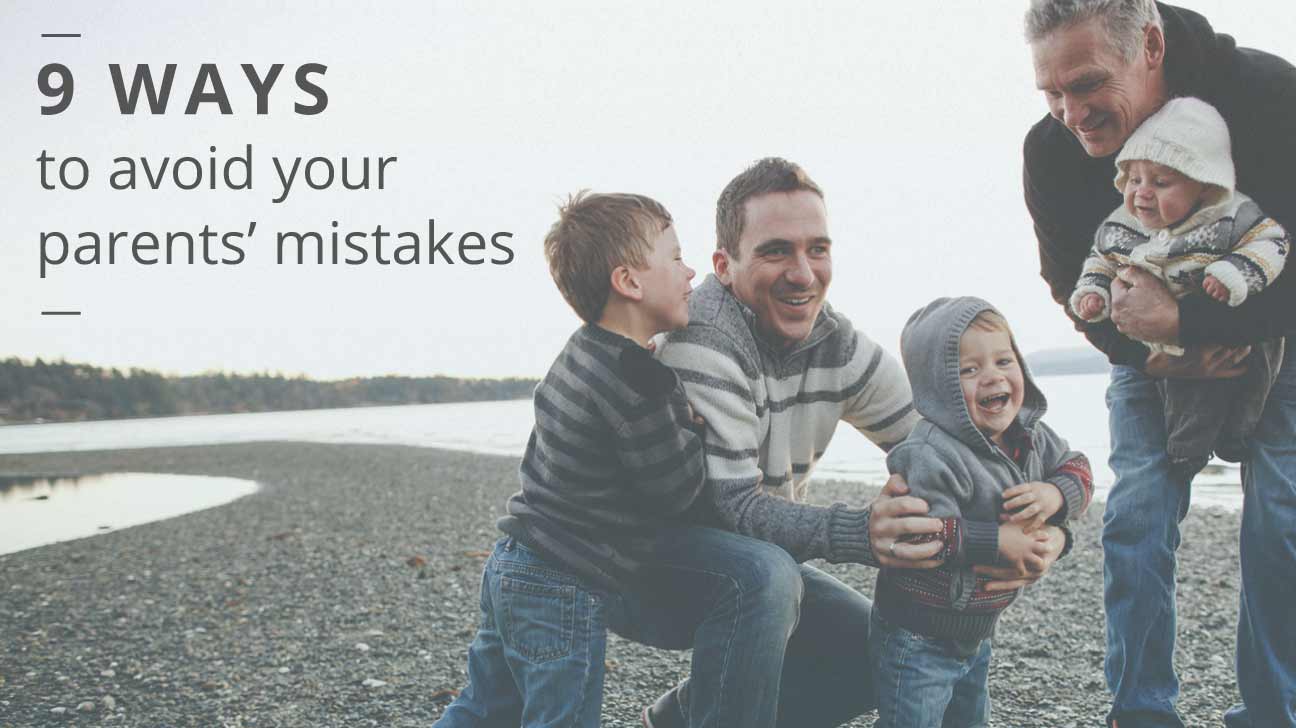
It’s probably the hardest job you’ll ever have, and there are no vacations or sick days. You’re trying to help another human become a functional member of society, which sounds like a pretty intimidating task. But it’s also incredibly rewarding when you do it well.
You may have heard something like this: “I open my mouth and my mother comes out.” Whether we realize it or not, we all take our parenting cues from our own parents. This can be good or bad, depending on what your parents were like.
Even people who describe their own childhood as happy may struggle with aspects of parenthood. For those of us who had less-than-ideal parental role models, determining what healthy behavior looks like can be very difficult.
The good news is that we’re not doomed to repeat the mistakes our parents made, but it does take work. Here are nine ways you can break the cycle.
1. Really know yourself
In order to recognize that something needs to be fixed, you have to know it’s broken. Until you acknowledge what your own parents did, how it made you feel, and how it’s shaping your behavior today, you won’t be able to make positive changes.
“All of our emotional interactions are based on patterns we learn in that family of origin,” says Dr. Gail Gross, a nationally recognized family, child development, and human behavior expert, author, and educator.
“When you’re parenting, know yourself and learn your behaviors,” she says. “Those patterns you learned as a child are now transferred to you as a parent, whether you want them or not.”
Peg Streep, author of “Mean Mothers: Overcoming the Legacy of Hurt,” stresses this as well. “You have to confront your childhood and to recognize how your own mother’s behaviors have influenced yours. Consciousness is the key.”
2. Work on fixing your behaviors
This is a process that can take time, but it’s definitely possible. You have to be present and aware of what’s happening in the moment and make a mindful decision to do something different.
For example, if your child spills juice all over the floor, your immediate reaction might be to yell at the child for being clumsy and thoughtless. But instead of going that route, you can stop yourself and react in a healthier way.
“We can deliberately and consciously override those knee-jerk reactions, and make a habit of changing our behavior to new behavior,” says Dr. Gross. “Unless you choose to override those impulses, behaviors don’t change.”
3. Watch your words
The words you choose can carry an enormous amount of weight in your child’s mind. Make the effort to learn what not to say. There are constructive ways to talk to your child about mistakes or discipline. Streep says it’s important to recognize the difference between inspiring your child and marginalizing them.
“Give yourself time and think about what you’re doing and how you felt as a child when you were yelled at and screamed at or shamed, etc. That stops you and gives you a minute to catch your breath and override your reaction,” recommends Dr. Gross.
4. Realize bad is stronger than good
Studies have shown that humans process negative or bad information or events more quickly and thoroughly than good ones. That means you’re more likely to remember and be impacted by bad things that happened in your childhood, and so are your kids.
“As a parent, you have to realize that the mistakes you make when you’re not paying attention or staying attuned carry more weight than the good things. You need five good things to outweigh one bad,” says Streep.
Working hard to avoid bad parenting behaviors, like physical or verbal abuse, ignoring your child’s emotional needs, or acting out of anger in the moment, is extremely important in giving your child a positive experience.
5. Don’t take things personally
Kids make mistakes, make messes, and throw tantrums. It can feel incredibly frustrating in the moment, especially when your child really isn’t cooperating. But they’re not doing these things as personal attacks on you. They need to be taught how to regulate their own emotions and why certain behaviors aren’t appropriate.
Remembering that the behavior isn’t a direct attack on you as a person can help you maintain your cool and deal with the situation better.
6. Know your child’s personality
Every child has different needs, and it’s your job as a parent to be able to read your child. That doesn’t mean you’ll get it right every time, but at least have a pretty good handle on your child’s personality traits and being able to tell when they’re getting what they need from you.
Some kids want a lot of your affection, while others might prefer more down time to be alone.
For example, if you have a child with ADHD, says Dr. Gross, “You want to give them more time and help them focus. A parent has to monitor them more closely.”
7. Practice ways to reduce stress
There are days when life in general is stressful. As a parent, it’s important to have healthy ways to deal with your own stress and anger, so it’s not projected onto your child. Dr. Gross recommends progressive relaxation techniques or yoga to help relieve stress and gain mindfulness.
8. Be able to evolve
Your parenting style and techniques should grow with your child. Learn how you can set healthy boundaries for your child at each stage of development. If you try to use the same parenting that worked on your toddler when dealing with your 12-year-old, you’re going to have some problems.
9. Recognize you’re not alone
Our culture can make it feel uncomfortable to talk about a painful childhood or the stress you feel as a parent. But just because these things aren’t widely discussed doesn’t mean they don’t hold true for many people. Streep says that according to her research, about 40 to 60 percent of the people on the planet had childhoods that didn’t meet their needs emotionally.
You’re definitely not alone in your struggles. Thanks to technology, today we’re lucky enough to have more ways of connecting to others who are also trying to heal. Something as simple as becoming part of an online community and swapping stories with others can be therapeutic.
Streep, who is also the daughter of an unloving mother, has cultivated a space on Facebook where her readers share stories about their own unloving mothers.
The takeaway
Some people are able to identify unhealthy behaviors on their own, and others need some extra help.
“If there is a problem with abuse during childhood, then we might need further help. We repeat the abusive behavior,” says Dr. Gross.
Get help if you’re having trouble. Finding a therapist you connect with can make a huge difference. They can give you the tools to heal so you don’t have to pass your pain to the next generation.


